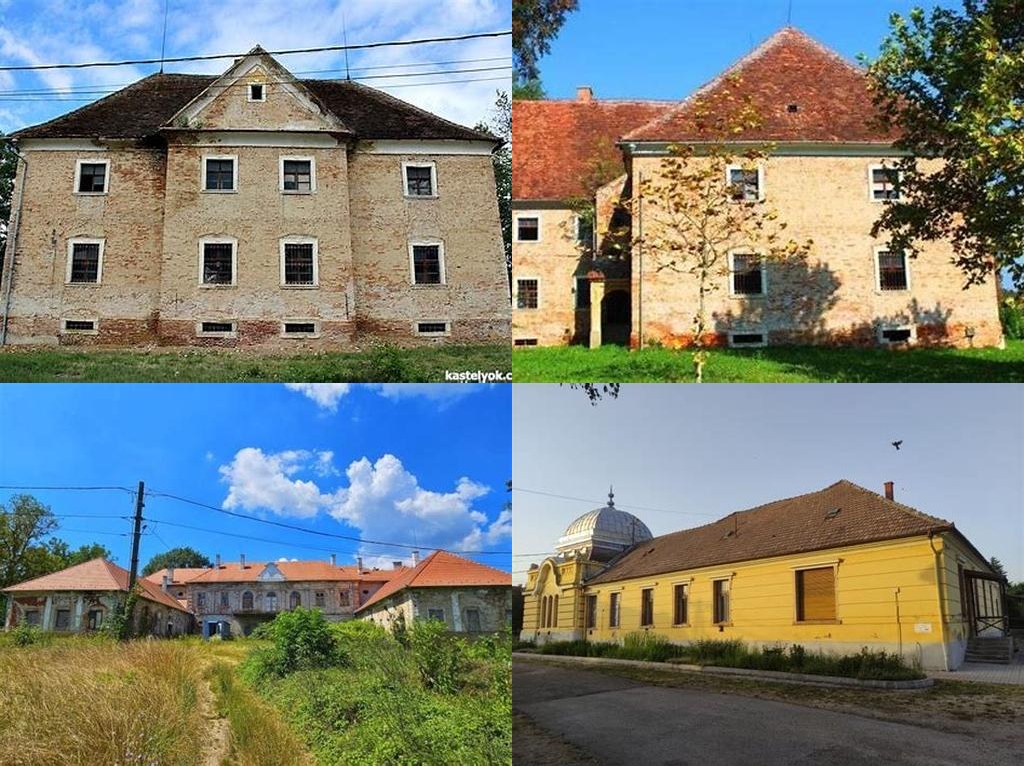
Tauber-kastély in the quiet village of Resznek is not the kind of place you’ll find swamped with tourists clutching guidebooks. Instead, you’re welcomed by the whisper of the wind through age-old trees and a gentle hush that makes you wonder if the walls themselves are holding onto secrets. Set gracefully amid the rolling green hills of Zala County, this mansion is a storybook spot that rewards visitors with atmosphere and a sense of intimate history you won’t get at Hungary’s grander palaces.
Approaching the mansion, you’ll likely notice its romantic, slightly timeworn façade—a reminder that, while the Tauber family aimed for grandeur, the home has always been lived in rather than merely preserved. Built in 1880 by the influential Tauber family, the structure is a beautiful, if restrained, blend of Neo-Classical forms and rustic rural charm. Its white walls and columned portico stand as a nod to the kind of Central European manor houses that were once the pride of local landowners. Edge closer, and the details begin to emerge: wrought iron balconies, intricate stucco work, and windows that have framed scenes of both contented domesticity and the winds of historical change.
Inside, stepping across old wooden floors, there’s a genuine sense that this was once, and in some ways still is, a cherished family residence. Unlike the palatial, museum-like spaces of Budapest, the rooms here feel accessible—every bit as likely to host a conversation as they are to shelter a piece of history. Period furnishings are scattered throughout, unafraid of the odd creaky chair or sun-bleached tapestry. Whispered legends say that the grand salon saw its greatest revelry in the early 1900s, often under the watchful gaze of Baroness Ilona Tauber, a local patron of music and arts, whose penchant for chamber concerts drew visitors from across the county.
The grounds themselves are worth lingering in. There’s a tranquil park that stretches beyond the main terrace, shaded by ancient horse chestnuts and kept meticulously green in the traditional style. If you follow the gravel paths, you’ll find yourself stumbling upon little surprises—a mossy garden statue here, the half-hidden remains of a former stable there, and a pond where, according to locals, the baron’s children once dared each other to swim on chilly spring mornings. At the edge of the park stands an old stone bench, favored by generations of the Tauber family for afternoon teas and quiet reflection, and now open to anyone in need of a rest or a moment of contemplation.
But while the exterior beauty and bucolic grounds certainly invite admiration, the true fascination lies in the layers of history embedded in every corner. During the turbulent years after World War II, the mansion was commandeered, repurposed first as a school and later as a local community center—a twist of fate that has lent the house a communal spirit lacking in more fortress-like castles. Stories still surface from time to time: a piano left behind by a departing family heir, letters discovered tucked into the wainscoting, and townsfolk who remember dancing through the halls on midsummer nights. Thanks to a recent community-driven renovation, the mansion has managed to preserve its unique mix of nostalgia and warmth while making gentle improvements that keep it welcoming.
It’s this very lived-in feeling—part elegant past, part homespun present—that draws visitors who value stories over souvenirs. The Tauber-kastély is not a grand tourist highlight where crowds jostle for the perfect selfie. Instead, it invites you to take things at your own pace, to let curiosity lead you through faded corridors and sun-dappled courtyards. Visit on a sunny afternoon, and you may find yourself in the company of an amateur historian or a gardener eager to share anecdotes about the last great apple harvest. Come in the off-season, and you might have the house almost to yourself, free to imagine the lives lived here across centuries.
Above all, the Tauber-kastély is for those who appreciate the poetry of place. It’s a fine spot for slow adventurers and accidental romantics, those who understand that sometimes the allure of a destination resides not in polished tours but in the quiet, lingering spirit that time leaves behind. Whether you settle in for an hour or wind up wandering all day, the mansion in Resznek rewards anyone willing to listen for its stories on the breeze.





